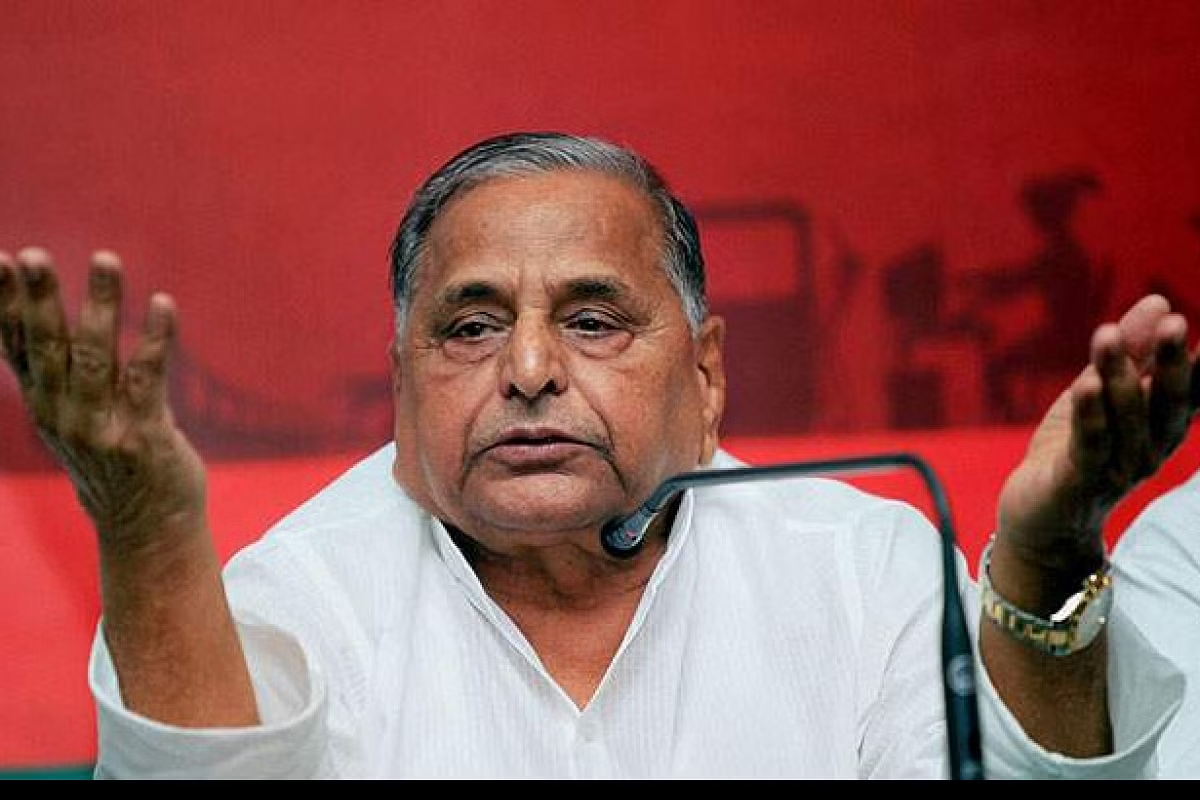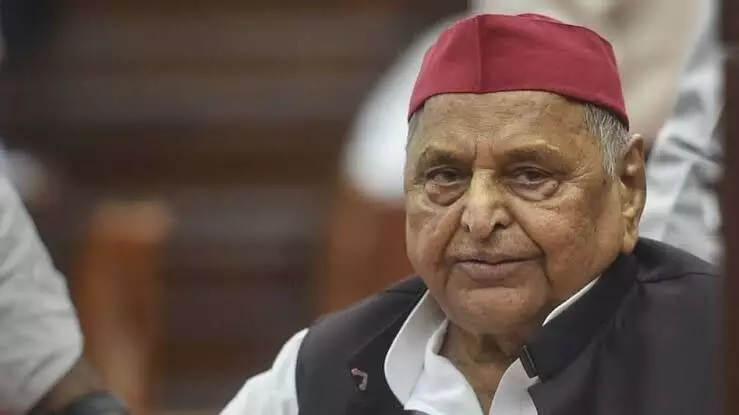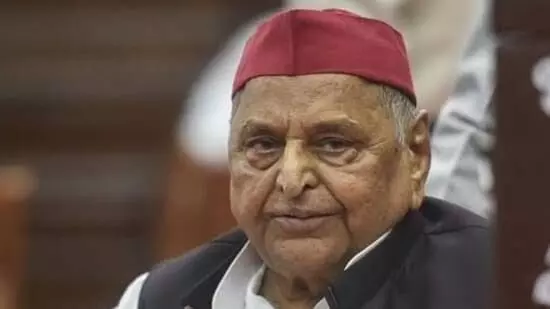
Adieu, dhartiputra 'Maulana' Mulayam
text_fieldsAll political leaders wish to be called a neta (leader) but talk of Netaji and everyone in India instinctively can tell that the person it refers to is Mulayam Singh Yadav. All politicians happily describe themselves as dhartiputra (son of the soil) but the only one who never needed to be named dhartiputra is Mulayam Singh Yadav. And the epithet Maulana Mulayam: anyone who has even remotely followed Indian politics knows it to be none other than Mulayam Singh Yadav, for standing up for the rights of Muslims in the country when the saffron storm was razing across the length and breadth of India, threatening to rip the communal fabric apart. He had the guts to order police firing when unruly kar sevaks threatened to break police cordon and march towards the Babri Masjid on October 30, 1990, to perform kars eva. He repeated the order on November 2 when a fresh onslaught was launched by the kar sevaks. In all, 28 kar sevaks had lost their lives. This was a feat which for ever turned him into a villain in the eye of majority of upper caste Hindus, and which earned him the sobriquet of Maulana Mulayam, with a huge political price to pay. But he never regretted the decision even once. Of course he mourned the loss of life of the misguided youth, but " to maintain law and order" in true letter and spirit was his political dharma, he often told this writer. To the uninitiated, " maintaining law and order" these days may sound just a cliché, but to Mulayam Singh, this was his political religion and which he followed diligently, unmindful of the price he would have to pay all his life.
Born into a poor farmer family on November 22, 1939 at Safai in Etawah distrit of Uttar Pradesh, Mulayam Singh Yadav grew up watching his father toil in the fields and his mother carrying food for him while balancing a stack of fodder on her head in one hand and his younger brother Shivpal in her lap on the other. Growing up amidst abject poverty, lack of resources, and lack of too many opportunities, it is indeed a miracle that the young Mulayam not only could complete his education with masters in political science from Agra University, but also became a good wrestler and then an extremely successful politician, using the same wrestling tricks to outmanoeuvre his political opponents. So shrewd and ruthless was he in his political calculations, that even his closest allies sometimes failed to guess his next move. His political instincts were so sharp that like phoenix, he rose every time the world had written him off.
Mulayam Singh cut his teeth into politics following Ram Manohar Lohia's socialist ideology. He won his first election when he was barely 28 years of age, in 1967 from Jaswant Nagar. Since then he never looked back. There were times when he was down, but never out. He won the assembly election eight times, and Lok Sabha election seven times. Once into politics, he flowered under the indulging guidance of Charan Singh, with whom, however, he fell apart when Charan Singh decided to pass on the Lok Dal leadership to his US-returned son, Ajit Singh. Mulayam Singh then joined hands with V P Singh and became the state Janata Dal president, and then going on to become the chief minister of Uttar Pradesh in 1989, with BJP support. But when the firing on kar sevaks happened in 1990, BJP withdrew support, but his government survived!! That too with Congress support, a party against which he had campaigned aggressively to dislodge from power in 1989. This government lasted till 1991.
This was the time when BJP's L K Advani was on the road with his rath yatra; the Ram mandir movement was at its peak. In 1991, the BJP came to power with a thumping majority in UP and a discredited Mulayam Singh Yadav, now derisively called Maulana Mulayam, was down in the dumps. This was the time he parted ways with V P Singh and formed his own party, the Samajwadi Party, in October 1992. Come December 6, 1992, the Babri Masjid was demolished, the Kalyan Singh-led BJP government in UP was dismissed and President's rule imposed. Post Babri demolition, the BJP looked set to thump back to majority because the opposition had become completely demoralised and discredited. And then Mulayam Singh Yadav brought another pigeon out of his hat! He joined hands with the Dalit party of Kanshi Ram, the BSP, and announced contesting the next assembly election in alliance with BSP. This was a masterstroke which till that moment was the most unimaginable political stunt. The caste groups supporting the two parties, backwards and Dalits, are usually at loggerheads on the ground and nobody had made a bet for even double digit number of seats for this alliance. But the wrestler had it planned well and the alliance won 189 seats, enough to form the government with support from a few smaller parties in 1993.
But even this government fell after two years, when BSP decided to withdraw support. And the infamous State Guest House incident happened when BSP legislators, who were meeting there under the leadership of Mayawati, were attacked by SP members. This was the time when the era of political uncertainties had begun in UP and the BJP had started flirting with the BSP, the two engaging in a political musical chair game. This was the time when Mulayam shifted his focus to Delhi and contested the Lok Sabha election in 1996, winning 19 seats. In 1996, VP Singh, who was the unanimous leader of opposition, refused to become the prime minister and Mulayam Singh Yadav emerged as the next choice for PM's post. This was, however, vehementaly opposed by Laloo Prasad Yadav and finally H D Devegowda emerged as the choice. For this Mulayam Singh Yadav could never forgive Laloo Yadav. He had to settle for the defence minister's post. It is another story though, that many years later he agreed to marry his brother's grandson to Laloo's youngest daughter. He always told this writer that one should not mix personal matters with political issues.
Even though Mulayam Singh's national politics was doing well, in 2003 his focus shifted back to UP and he cobbled up a most cynical combination of political opponents to form government again. He broke with the BSP and Congress to form the government which was also supported by the then rebel BJP leader Kalyan Singh and Rashtriya Lok Dal leader Ajit Singh. This government lasted till 2007. Then followed a stint of BSP government till 2012. In 2012 the Samajwadi Party , defying all political calculations, won a majority on its own but this time Mulayam Singh Yadav stepped aside to make way for his son Akhilesh Yadav to become the chief minister: a decision he regretted later because Akhilesh stopped listening to him. The heartbroken father was being pulled apart in two opposite directions: the feuding brother Shivpal Yadav and the rebellious son Akhilesh. In 2017, shortly before the assembly election, Akhilesh finally dislodged him from the party president's post. Now relegated to just being a patron, the SP leader finally publicly sided with his son. It was at this point that he started battling illness and has been in and out of hospitals in Lucknow and Delhi since then.
Mulayam Singh Yadav may have made many political enemies during his 60 odd years of political life, but he never compromised on his opposition to right wing communal politics and stood steadfastly for the rights of Muslims in this country. The best part of his political ideology was that he made friends even with his political enemies. Who can forget his last speech in Lok Sabha before the 2019 LS election, when he wished prime minister Modi luck and said he wanted to see him back as prime minister. If there was one thing he regretted, it was his lack of proficiency in English. He confessed to this writer that this was the reason the elite section of the media mocked him and could not see him as a national leader. But if there is one leader who will always be remembered as Netaji, it is Mulayam Singh Yadav.


























